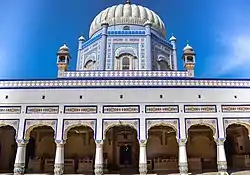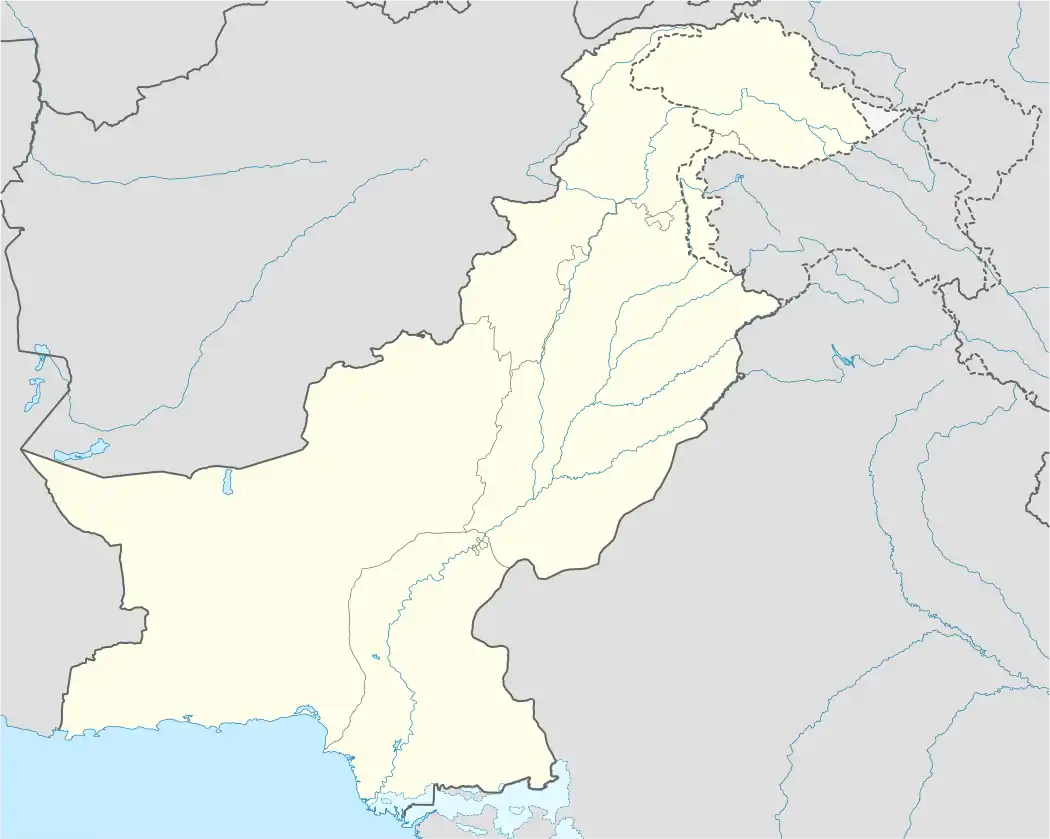Taunsa Sharif
تونسه شريف | |
|---|---|
 Taunsa | |
 Taunsa Sharif Location in Pakistan | |
| Coordinates: 30°42′20″N 70°39′28″E / 30.70556°N 70.65778°E | |
| Country | Pakistan |
| Province | Punjab |
| District | Taunsa |
| Tehsil | Taunsa |
| Union councils | 3 |
| Elevation | 157 m (515 ft) |
| Population | |
| • Total | 168,450 |
| Time zone | UTC+5 (PST) |
| • Summer (DST) | UTC+6 (PDT) |
| Post code | 32100 |
| Area code | 0642 = |
Taunsa Sharif (Urdu,Punjabi: تونسه شريف) is a city in Punjab province of Pakistan. It is the capital of Taunsa District. Taunsa Sharif is primarily inhabited by Saraiki and Baloch descent people. It is situated on the bank of River Indus. Taunsa is an agricultural area known for its fertile land and crops.
History
Taunsa Sharif was an ancient settlement and remained a village or town earlier to 21st century. Taunsa was part of wide Multan region inhabited by mostly Baloch tribes like Malghani, Buzdar, Qaisrani and other Baloch descent people. The region was conquered by Arab Ummayads in 8th century CE spreading Islam in the region.
Location
Taunsa Sharif is located on the Karachi-Peshawar Highway, which is also known as Indus Highway. It is approximately 120 kilometers from major cities: Multan, 975 kilometres (606 mi) from Karachi, 430 kilometres (270 mi) from Peshawar, and 450 kilometres (280 mi) from Lahore. Taunsa is also the location of one of the headworks on the Indus River called Taunsa Barrage, located 16 kilometres south of Taunsa Sharif city. Taunsa is surrounded by Koh e Sulaiman mountain range.
Taunsa Barrage
Taunsa Sharif is also the location of one of the notable structures on the Indus River called Taunsa Barrage, located several kilometres south of Taunsa city. It was designated a Ramsar site on March 22, 1996. The Taunsa Barrage was completed in 1958, and it has been identified as the barrage with the highest priority for rehabilitation. It requires urgent measures to avoid severe economic and social impacts on the lives of millions of poor farmers through interruption of irrigation on two million acres (8,000 km²) and drinking water in the rural areas of southern Punjab, benefiting several million farmers.
In 2003, the World Bank approved a $123 million loan to Pakistan to rehabilitate the Taunsa Barrage on the River Indus whose structure had been damaged owing to soil erosions and old-age. The project was designed to ensure irrigation of the cultivated lands in the area of the Muzaffargarh[2] and Dera Ghazi Khan Tehsil[3] canals, and through the Taunsa-Panjnad Link Canal that supplements the water supply to Panjnad head-works canals.
Taunsa Barrage also serves to provide for a variety of fish, which contributes towards fulfilling the food related needs of area.